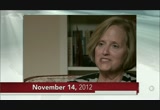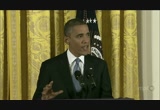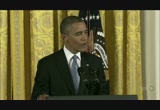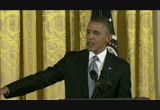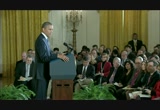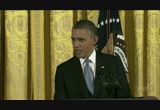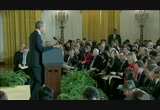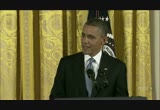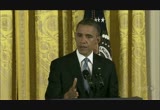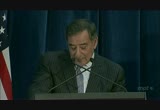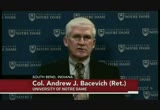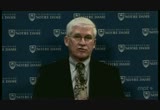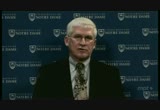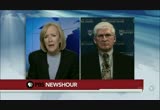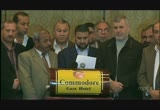tv PBS News Hour PBS November 14, 2012 6:00pm-7:00pm EST
6:00 pm
captioning sponsored by macneil/lehrer productions >> woodruff: president obama held firm on higher taxes for the wealthy today and said there's no evidence national security was breached in the petraeus affair. both comments came in his first official news conference since the election. good evening. i'm judy woodruff. >> ifill: and i'm gwen ifill. on the newshour tonight: we have extended excerpts of the president's wide-ranging exchange with reporters, from immigration to benghazi to reaching out to mitt romney. >> woodruff: we zero in on two topics, starting with the spiraling scandal that forced the c.i.a. director to step down. >> ifill: and we assess the administration's post-election
6:01 pm
agenda with senators dick durbin and kay bailey hutchison. >> woodruff: then, ray suarez gets the latest on the escalating violence in gaza after israeli air strikes killed the military leader of hamas. >> ifill: plus, there were new calls today for laws to police pharmacies like the one linked to the meningitis outbreak. betty ann bowser's update includes the story of one family's loss from the disease. >> i can't really think of one them them without the other. he was such a vibrant person that who lit up the room and there's such a great big hole missing. >> woodruff: that's all ahead on tonight's newshour. major funding for the pbs newshour has been provided by:
6:02 pm
and with the ongoing support of these institutions and foundations. and... this program was made possible by the corporation for public broadcasting. and by contributions to your pbs station from viewers like you. thank you. >> woodruff: the president faced the white house press corps today in a wide-ranging session. he addressed two major stories-- the fiscal cliff and the sex scandal that ousted the c.i.a. director-- plus immigration, climate change and more. newshour correspondent kwame holman has the story. >> please have a seat. i hear you have some questions for me. ( laughter ) >> reporter: the president went right to the point in his first news conference since winning re-election eight days ago. topping the list: the looming fiscal cliff, $650 billion in
6:03 pm
spending cuts and tax increases kicking in at the first of the year. >> if congress fails to act by the end of this year, everybody's taxes will automatically go up, including the 98% of americans who make less than $250,000 a year and the 97% of small businesses who earn less than $250,000 a year. that doesn't make sense. our economy can't afford that right now. certainly no middle-class family can afford that right now. >> reporter: mr. obama signed legislation extending the bush- era tax cuts two years ago, including those affecting the wealthy, but he said today things are different this time. >> well, two years ago, the economy was in a different situation. we were still very much in the early parts of recovering from the worst economic crisis since the great depression. but what i said at the time is
6:04 pm
what i meant, which is this was a one-time proposition. and you know, what i have told leaders privately as well as publicly is that we cannot afford to extend the bush tax cuts for the wealthy. what we can do is make sure that middle-class taxes don't go up. mandate, i've got one mandate. i've got a mandate to help middle-class families and families that are working hard to try to get into the middle class. that's my mandate. that's what the american people said. they said, "work really hard to help us." that's my mandate. i don't presume that because i won an election, that everybody suddenly agrees with me on any... everything. >> reporter: and the president directly challenged republicans to drop the tax breaks for the better-off. >> a modest tax increase on the wealthy is not going to break their backs. they'll still be wealthy, and it
6:05 pm
will not impinge on business investment. but what i will not do is to have a process that is vague, that says we're going to sort of, kind of raise revenue through dynamic scoring or closing loopholes that have not been identified. and the reason i won't do that is because i don't want to find ourselves in a position six months from now or a year from now where, lo and behold, the only way to close the deficit is to sock it to middle-class families >> reporter: still, mr. obama stopped short of saying flatly that it's a deal breaker if republicans insist on keeping tax rates for the rich where they are now. >> i'm less concerned about red lines, per se. what i'm concerned about is not finding ourselves in a situation where the wealthy aren't paying more or aren't paying as much
6:06 pm
they should. middle-class families, one way or another, are making up the difference. >> reporter: mr. obama also faced questions on the other major story in washington right now, the extra-marital affair that ended david petraeus' career as c.i.a. director. today, he said he's seen no evidence that national security was compromised. >> obviously, there's an ongoing investigation. i don't want to comment on the specifics of the investigation. the f.b.i. has its own protocols in terms of how they proceed. we are safer because of the work that dave petraeus has done. and my main hope right now is-- is that he and his family are able to move on and that this ends up being a single side note on what has otherwise been an extraordinary career. >> reporter: the president was pressed on whether he should have been informed sooner of the f.b.i.'s investigation. he said he was withholding judgment. >> i think you're going to have to talk to the f.b.i. in terms of what their general protocols
6:07 pm
are when it comes to what started off as a potential criminal investigation. and one of the challenges here is-- is that we're not supposed to meddle in, you know, criminal investigations. and that's been our practice. and so my expectation is-- is that they followed protocols that they already established. what i'll say is that if-- it is also possible that had we been told, then you'd be sitting here asking a question about, why were you interfering in a criminal investigation? so, you know, i think it's best right now for us to just see how this whole process unfolded. >> reporter: also on reporters' agenda today: harsh criticism of u.n. ambassador susan rice by republican senators lindsay graham and john mccain. they attacked her for saying the attack on the u.s. consulate in benghazi, libya, had been a spontaneous outburst of muslim anger when officials already knew it was a terrorist attack.
6:08 pm
and they insisted they'd oppose having her replace hillary clinton, who's stepping down as secretary of state. >> this is about the role she played around four dead americans when it seems to be that the story coming out of the administration-- and she's the point person-- is so disconnected from reality, i don't trust her. and the reason i don't trust her is because i think she knew better, and if she didn't know better, she shouldn't be the voice of america. >> reporter: in response, the president was vehement in his defense of ambassador rice. >> let me say specifically about susan rice, she has done exemplary work. she has represented the united states and our interests in the united nations with skill and professionalism and toughness and grace. as i've said before, she made an appearance at the request of the
6:09 pm
white house in which she gave her best understanding of the intelligence that had been provided to her. if senator mccain and senator graham and others want to go after somebody, they should go after me, and i'm happy to have that discussion with them. but for them to go after the u.n. ambassador, who had nothing to do with benghazi and was simply making a presentation based on intelligence that she had received, and to besmirch her reputation is outrageous. >> reporter: back on domestic issues, president obama pledged quick action in a second term on comprehensive immigration reform. he used a question from the correspondent for telemundo to point to his strong support from latinos in the election. >> this is the fastest-growing group in the country.
6:10 pm
and, you know, historically, what you've seen is latino vote- - vote at lower rates than the broader population. and that's beginning to change. you're starting to see a sense of empowerment and civic participation that i think is going to be powerful and good for the country. and it is why i am very confident that we can get immigration reform done. and my expectation is-- is that we get a bill introduced and we begin the process in congress very soon after my inauguration. >> reporter: the immigration issue saw little action during mr. obama's first term, as did climate change. today, the president said he'd work with congress on that issue, as well. and he said again he wants to meet with the man he defeated last week. >> i-- i'm sure that governor romney is spending some time with his family. and my hope is, before the end of the year, though, that we
6:11 pm
have a chance to-- to sit down and talk. you know, there-- there are certain aspects of governor romney's record and his ideas that i think could be very helpful. and, well, to give you one example, i do think he did a terrific job running the olympics. >> reporter: no word on when such a meeting could take place. >> ifill: in case you missed it, you can watch the complete news conference on our web site. coming up, more from the president's first post-election news conference on the investigation into the generals' scandal and his second-term agenda. plus, israeli air strikes in gaza and one family's battle with meningitis. but first, with the other news of the day, here's hari sreenivasan. >> sreenivasan: the president's challenge to republicans today on taxes sets up a new confrontation in congress. even before the white house news conference, senate minority leader mitch mcconnell warned again that raising rates on high-income earners will have almost no effect on the deficit. but, he said, there is another way.
6:12 pm
>> republicans believe that there is a way to get additional revenue. we also believe that additional revenues should be tied to the only thing that will save the country in the long run, and that is reforming entitlements. >> sreenivasan: but the senate's democratic majority leader, harry reid, objected. he said if talking about entitlements means social security, democrats will never agree. >> social security is not part of the problem. that's one of the myths the republicans have tried to create. social security is sound for the next many years. but we want to make sure that in the outer years people are protected also, but it's not going to be part of the budget talks as far as i'm concerned. >> sreeniivasan: congressional leaders meet with the president later this week. wall street took a hit after the president's news conference. stocks fell on worries that the partisan divide on taxes will prevent a deficit deal. the dow jones industrial average lost 185 points to close near 12,571.
6:13 pm
the nasdaq fell 37 points to close under 2,847. house minority leader nancy pelosi will run again to keep her job. there had been questions about her future after last week's election. democrats picked up a handful of seats in the house but failed to retake control from republicans. today, the 72-year-old pelosi said fellow democrats encouraged her to stay on. >> my colleagues made it very clear. in fact, i think they must have coordinated with each other because their message was clear: don't even think of leaving. that was what i got over and over and over and over again. and i felt is this a coincidence or >> sreenivasan: pelosi is the only woman ever to serve as speaker of the house, but she lost that position when republicans won a majority in 2010. meanwhile, newly elected independent senator angus king of maine announced he will caucus with democrats. that effectively gives them 55 votes when the new senate convenes in january. the u.s. commander in afghanistan, marine general john allen, won a statement of support today amid questions
6:14 pm
about his relationship with a florida woman. the military is now investigating allen's extensive contacts with jill kelley, a tampa socialite, between 2010 and this year. for now, allen's nomination to become nato's supreme commander in europe has been put on hold. but in australia today, u.s. defense secretary leon panetta cautioned against a rush to judgment. >> no one should leap to any conclusions here. general allen is doing an excellent job at i.s.a.f. in leading those forces. he certainly has my continued confidence to lead our forces and to continue the fight. but his nomination has been put on hold as a prudent measure until we determine what the facts are. and we will. >> sreenivasan: at the same time, there were signs the f.b.i. has widened the investigation that uncovered an affair between david petraeus and his biographer, paula broadwell, and led petraeus to resign as c.i.a. director. the "washington post" reported agents found classified files in
6:15 pm
a search of broadwell's north carolina home on monday night. petraeus has denied he passed on any such documents. europeans in half a dozen countries protested against austerity measures today. they snarled transit and, in some places, battled police. we have a report narrated by emma murphy of independent television news. >> reporter: in rome, as across southern europe, they protested peacefully in the thousands. but others came prepared, willing to let the anger they feel towards austerity to be displayed through violence. in a cloud of teargas and the echo of petrol bombs, the police became the target of protesters anger. their shields are little protection from the rocks as their status is from the financial crisis in their country. though on different sides in this protest, both suffer the consequences of economic decline. in spain, where one in four are out of work, anger and desperation. ordinary people who believe the spending cuts designed to improve their position have
6:16 pm
actually made it worse. there have been many cutbacks here, but there was no shortage of rubber bullets nor police, as time and again those feeling the hurt of austerity also felt the hurt of batons wielded against them. "they're taking our rights," this man says. "the banks and the other businesses, they're stealing our salaries." and that's a sentiment shared in greece, where women place plastic bags over their faces to highlight what they say is the suffocation of their country. it's now in it's fifth year of depression, and economic output continues to shrink by around 7% a year. in portugal, despite unemployment running at 15%, the protesters were peaceful. but their scale and banners told of their displeasure and who they blame for it. with 26 million now unemployed, this was a day for europe to stand together. but it is unlikely to force a change in economic policy. >> sreenivasan: the state of
6:17 pm
california held its first auction today of greenhouse gas pollution permits. the cap-and-trade plan is a key part of the state's global warming law enacted in 2006. under its provisions, businesses must cut emissions to a certain level or buy allowances from companies that don't need all of their allowances. the program still has to survive a court challenge. the u.s. air force will change the way it selects officers and instructors who train new recruits. that follows a sexual abuse scandal at lackland air force base near san antonio, texas. an investigation found 23 instructors allegedly abused at least 48 female recruits. so far, five people have been convicted on charges ranging from adultery to rape. those are some of the day's major stories. now, back to judy. >> woodruff: and we turn back to one of the topics raised in president obama's news conference today, the investigation of former c.i.a. director david petraeus. the former military leader's resignation after admitting to an extramarital affair raises questions about the standards americans hold u.s. officials
6:18 pm
and military officers. we take a look at that with two who follow civilian-military relations closely. richard kohn is professor emeritus of history at the university of north carolina. during the 1980s, he was the chief historian for the u.s. air force. and retired colonel andrew bacevich is a research fellow at notre dame's krock institute for international peace studies. we thank you both for joining us. before i begin i have two items to share, late-breaking items in the news on this story. the "new york times" identified the f.b.i. agent in tampa who was originally given the information from jill kelley about threatening e-mails. his name is frederick humphries, ii. he's said to be a veteran counterterrorism investigator. the second item, the associated press is reporting that general john allen is saying he intend to fully cooperate in this investigation and hopes to get
6:19 pm
to the bottom of it as soon as possible. hopes that authorities do. but colonel andrew basevich, let me start with you. what is your overall reaction to this, to the petraeus story, the potential involvement of general allen-- although we don't know about that. how are you taking this all in in? >> well, i think it's very useful to be remindd from time to time that four-star generals are not gods but mere mortals. and as mortals ourselves, perhaps we can, therefore, assess their performance. stand in judgment. and if you consider the performance of senior american military leaders over the past ten years of war, it seems to me that it's been rather disappointing. the expectation that when the --
6:20 pm
when we send u.s. forces to fight that they will achieve victory, that expectation has not been met. and we've ended up with two very long wars one of which has ended in something other than victory-- i'm referring to iraq-- and a second war-- afghanistan-- which will ultimately end and nobody expects it's going to end in victory. it seems to me it's fair to ask why have we gotten such disappointing results after such tremendous exertions by our soldiers and part of the answer-- just part of the answer-- it seems to me is a defective, disappointing, mediocre senior military leadership. >> woodruff: well, i don't know whether we can get into a full discussion of whether the wars have been successful or not but professor kohn, mere mortals? is that what we're looking at here? >> well, it is, judy, except that we do hold these mere
6:21 pm
mortals to a very high standard. they hold themselves to a very high standard. after all, we give senior military leaders our children and grandchildren and entrust them with the national security of the united states because they exist in a hierarchical organization and because of the demands of combat and the stresses of waging war are so great. they have very high standards. they hold themselves to it. and so it's a kind of an extra tragedy when people of such prominence and such apparent success-- or at least celebration-- have a personal fall like this. or at least in the case of general petraeus. we don't know about general allen. >> woodruff: professor kohn, do you believe general petraeus should have been required to step down from the c.i.a.? >> well, yes, i do. because to have a secret affair-- even if it becomes public-- puts him in a position of being able to be blackmailed.
6:22 pm
the questions that are asked of intelligence officers and officials are always about things that could embarrass them such that they could be compromised by enemies of the united states and because the c.i.a. holds its peach to such standards i think his credibility would have been undermined if it had been public and if it was private then he could have been compromised. >> woodruff: colonel basevich, what about that particular question of whether general petraeus should have been required to step down because of what happened? >> well, i have to say, it's not clear to me he was required to step down. if i understand the sequence of events, he went to see his immediate boss, general clapper, the director of national intelligence and clapper said that petraeus ought to step down, but subsequent to that petraeus went to see the president, his real boss, and i
6:23 pm
don't know for a fact that the president said "you're out of here. you're finished." it seems that the president actually was somewhat reluctant to accept the resignation. i would accept general petraeus' explanation at face value that he was ashamed, i think rightfully ashamed, at his conduct and felt that on that basis he should not go forward. now, professor kohn is absolutely correct that there are some security issues here and that's why i think it will be very interesting to find out what the f.b.i. learns as they try to determine where the classified documents that paula broadwell has in her positions, where those came from. that's a major unanswered question. >> woodruff: that's right. and there's so much we still don't know about this. we learn more everyday. there's still so much.
6:24 pm
but professor kohn, how much confidence, how much admiration should americans heap on these military leaders? and i guess you could say that question applies to anyone in public life. but what about these individuals in whom we entrust the lives of young men and women who go off to serve in our wars overseas? >> i think we need to give them great confidence and great respect, but i'm uncomfortable with the idea of adulation. these men and women serve the united states. they have high responsibility. they're trained. they rise to their position almost exclusively through merit. so they deserve our respect. but at the same time they have to be held accountable by their own armed services, by the department of defense, by the white house and particularly by the congress which has a different but somewhat equal role in the supervision of the
6:25 pm
military and i think the american people deep down recognize that. this enormous reverence that we've had for the military in the last 25 years is not the norm in american history. our military is one that for most of our history of citizen soldiers with some respect but also some suspicion of the professional. >> woodruff: quickly to both of you, colonel basevich, how does the country get this back in some balance and what effect do you see this having in the long term potentially on the public's view of the military? >> i think professor kohn put his finger on it. that there is a tradition which we abandoned in the wake of the vietnam war. and especially since the 190s of skepticism about military institutions and military power. certainly we have an obligation
6:26 pm
to support the troops, in particular we have an obligation to support the troops when they're committed to a war. but supporting the troops is not inconsistent with asking hard and critical questions about the way wars are being conducted and what we are getting in return for the vast investment of blood and treasure. >> woodruff: finally, professor kohn, how do you see the effect on the military going forward and getting all this in some balance? >> well, i think it joins another stream of thought and discussion in public about the way in which we develop our senior military leadership. are we choosing the right people on the right criteria? i don't think there's any question that we don't want people violating the trust of the american people and that goes in their personal lives, too. but it raises, i think, other issues that the public and the government need to consider and this might restore, i think,
6:27 pm
some balance and understanding and remind the american people that wonderful as these people are, indeed, they're only human. >> woodruff: professor richard kohn, colonel andrew basevich, we thank you both. >> thank you. >> thank you. >> ifill: the president has a full plate as he prepares to begin his second term. today, he said he will enter negotiations on his own terms. but will that fly on capitol hill? for that we turn to two senators: democrat dick durbin of illinois; and kay bailey hutchison of texas, whose three terms in the senate will end in january. senator durbin, the president said today his only mandate is to reach out and serve the middle-class. what does that mean? >> i think the president made it clear during his campaign. we want to provide protection, so there will be no tax increases for families making $250,000 a year or less. these are families which certainly include most if not all middle-income families struggling paycheck to paycheck. there's no reason their taxes
6:28 pm
should go up. in fact, we ought to give them tax relief. that's just exactly what the stat passed, the house is sitting on that bill, the president is calling on them to pass it. >> ifill: senator hutchison, i'm going to ask you the same question because i get the feeling your interpretation may be different. but when the president says "i want to raise taxes on the wealthiest, people who earn over $250,000 a year and that's a deal breaker if that doesn't happen," does that sound to you like you're moving forward? >> well, i hope that we can come together on our joint goal of bringing down the deficits and getting our fiscal house in order what republicans are saying is we need to do this in a way that encourages jobs and hiring people and if you tax the people who create jobs, who can give jobs, people who are not hiring right now because there is no indication of where we're going with this, where are these taxes going to be? and i think we're in a -- on an
6:29 pm
economic sort of humdrum and we need to show business people that they can count on low taxes they know what their costs will be. they will be able to put more people to work and that will stimulate the economy and the buying of those people and create more revenue because people are working. that's our approach. >> ifill: senator hutchison, one of the thing it is president said today and has said a couple times last election night is that the one thing americans knew when they voted for him is to keep this promise to not extend the bush tax cuts. are we on the same page here? >> i don't think so. i don't think that that is what people voted on. i think he was honest about saying he wanted to raise taxes on the rich. that's what he said in the campaign. and he is trying to be honest about that. but i don't think that that's why people voted for him. i think people voted for him because they believed he would
6:30 pm
help the middle-class and they know that jobs are scarce, that we have almost an 8% unemployment and i think what they want is for him to fix this. and what we want is for him to fix this with our help and in a way that will be pro-growth and pro-economic vitality. >> ifill: so senator durban, help me here. how is what is being said on capitol hill today which everybody says we're going to work together, we're going to compromise, how is that different from where we left this play last time we were sitting in the audience? >> we are edging closer to the cliff. >> ifill: how? >> december 31 is the deadline. on that date there will be dramatic changes in the tax laws as they affect middle income and upper income families and we're going to see spending cuts, automatic spending cuts, going in place. so we voted for this, democrats and republican ace like voted for it, said we want to make things so ominous, so foreboding that we'll do something.
6:31 pm
i think that will move us to action. the president has said the first move should be protect middle income families from a tax increase. if speaker boehner says i'll go along with that, that's where we'll start. i think the conversation is under way for a solution. >> ifill: senator durban, are you kicking the can down the road by only talking about the tax ruts and not talking about the spending cuts as well? >> let me tell you something, i was on the bowles simpson commission, i voted for it, bipartisan commission that included spending cuts as well as revenue increases. i know that to reach four or five trillion dollars in deficit reduction you need to put everything on the table. not just taxes for the wealthy. that's an important piece of it, but it isn't all of it. you need much more. >> the president said today in his news conference that he was very familiar with the literature on the overreach of presidents in their second term or their potential for overreach. do you think that's a possibility here? do you see that? we have heard, for instance, republicans say, hey, we can talk about immigration now.
6:32 pm
is it possible that some things actually are in reach? >> oh, i do think -- i think immigration reform is in reach senator durban and i have worked on a dream act alternative called -- something that i think would be acceptable to the american people and help these kids who are in this kind of never-neverland that we need to get them out of. senator kyl, senator rubio, senator durban. i think we can do that. and i want to say on the simpson bowles commission i think they are a starting place and every senate republican that was on that commission also voted for simpson bowles so you have a bipartisan potential as a starting point. maybe you don't like everything in it. but honestly, gwen, entitlement reform is going to have to be part of an overall deal if it's going to impact the deficits and the long-term debt and i think if we have tax reform and we
6:33 pm
really look at entitlement reform then we would be able to work together because i think republicans will certainly come to the table if we have a fair tax system and also we know that the cuts in entitlements that must be made will be made. you know, it's actuarally, social security can't hold the way it is now and we all want it to. >> ifill: i would love for one or both of you to take a whack at explaining to our audience-- starting with you senator durbin-- what is different now than before the election? a lot of what i'm hearing, including that the gauntlet is being down down about the president's potential choice of secretaries of state it sounds like people are digging their heels in in opposite corners and don't see things coming together. am i missing? >> well, the folks trying to hit a new crescendo. one of those things that was loud and clear across america.
6:34 pm
people are sick and and tired of these political gymnastics. they want results. and they hope democrats and republicans will work together. what has changed? well, the american people have spoken and under our system of government, a democratic system-- small "d"-- that's an important historic milestone. he won the majority of the popular vote and an overwhelming majority of the electoral vote. secondly, we face a deadline with the cliff on december 31. those are the two factors that should move us toward working toward a compromise. >> ifill: senator hutchison, your thoughts on that? >> yes, i think the republicans lost big time and that's a difference. i think we're near the fiscal cliff. i think that's a difference and the president is looking at his legacy and the president can step up to the plate now and be the leader that brings people together. that's what he promised in his first campaign. it has not happened. now is the time with his legacy before him that he can lead. put something on the table and
6:35 pm
let's start working on something that is a proposal from the president that congress can begin to go back and forth with him on. >> ifill: senator kay bailey hutchison, senator dick durban, thank you so much. >> wooddruff: there are new fears tonight of a widening conflict between israel and hamas after a major escalation today-- more than 20 air strikes and at least ten palestinians dead ray suarez reports. ( sirens ) >> suarez: it began with a precision air strike that left twisted metal and flaming debris on the streets of gaza city. the target: ahmed jabari, head of the military wing of the militant group hamas, which rules gaza. he was at the top of israel's most wanted list and the most senior hamas official killed since israel's last war in gaza in 2009.
6:36 pm
the israeli military posted video of the strike on you tube and said it was the opening round of a larger campaign dubbed "operation: pillar of defense." >> the goal of the operation is to defend israeli people and also target and cripple those terror organizations responsible for the ongoing rocket fire-- namely hamas, islamic jihad and others. >> suarez: in short order, smoke rose across the gaza city skyline from other air strikes, and fires burned into the night as the attacks continued. and prime minister benjamin netanyahu warned israel might expand the operation, possibly including a ground offensive. in turn, hamas proclaimed a state of emergency and called for retaliation. >> ( translated ): ahmed al jaabari has long worked and waited for this day. today, he is getting his victory as a martyr. our zionist enemy will, god willing, pay a price for this cowardly assassination.
6:37 pm
>> suarez: hamas militants answered with rocket fire, but the israelis said their "iron dome" defense system intercepted 13 incoming rockets over southern israel. southern israel. all of this followed mounting tensions in recent days. on saturday, another palestinian militant group claimed responsibility for this attack on an israeli army jeep that wounded four soldiers. the israelis and hamas had exchanged other blows, as well, and, earlier this week, neither side showed any sign of stepping back. >> ( translated ): the islamist and nationalist parties have the right to resist the zionist occupation and to confront its aggression by all available means. >> the matter has definitely not ended, and we will decide how and when to act at the time when there will be a need. >> suarez: with today's escalation, egypt pressed for an end to the israeli air strikes. today, palestinian president mahmoud abbas asked the arab league to call an urgent meeting to discuss the strikes, and
6:38 pm
united nations chief ban ki-moon called for a "de-escalation of tensions." >> suarez: for more, i'm joined by phone with sheera frenkel, middle east correspondent for the "times of london" in jerusalem. sheera, we reported on the rising tensions between the israelis and the palestinians in gaza. but was there something in particular that set this off? >> in the last three or four hours that there have been a slowdown in hostilities between israel and the gaza strip. in fact, earlier in today there had been no exchanges of violence across the border. but when i spoke to officials about why they decided to start targeted assassinations and launch the operation in gaza, their answer was actually intelligence data they had received that militants in gaza had been smuggling in more high tech weapons and that it would really create damage to the military arsenal and that their decision to hit gaza and
6:39 pm
assassinate the senior leader came on the basis of that intelligence. >> suarez: tell us more about achmed alga barry. was he important to the military structure in gaza? >> there's a lot of disagreement about who he was. what is certain is he played a very central role between hamas and gaza and their counterparts in egypt, lebanon, and syria. he also seemed to have quite a bit of ties to iran and was known to (inaudible) for the hamas regime. israel, of course, when we saw him -- only saw him as a mastermind of what they called terror attacks. he was said to be the person behind the kidnapping of israeli soldier gilad that hraoet. and in the photograph the shalits released, you can see him standing there. >> what do we know about what's going on inside gaza, whether they're preparing for war,
6:40 pm
whether they're standing by for a possible land incursion? >> the people i spoke in in gaza today describe confusion and chaos. i spoke to one gentleman in the northern part of gaza who has four children and he said as he was moving towards the center he saw shells and went back home. in problem is that no one in gaza knows where it's safe right now. the air strikes that started earlier in the afternoon are scattered in areas. so people are scared that they're in the midst of another war and one they're not prepared for. >> suarez: just in the past few hours the israeli cabinet has authorized a callup of reservists? is that a big step? an important step in this conflict? >> no, that call is still being limited. it's only 700 people, not a widespread callup yet. now, we've left the option open, they said they might call up more people.
6:41 pm
they've made it very clear that a ground operation could be on the horizon and that they're preparing for tha that eventual. but what i understand in the short run is that they're limiting the operation in gaza to the navy ships that are off the coast of gaza right now who are shelling from the ocean and to the ongoing air strikes that we're seeing and the israeli airports using both drones and planes >> suarez: in the back-and-forth attacks between israel and gaza there's been concentration on means but not a lot of discussion about ends. now the speculation about a ground assault what's the end game for israel? what would it hope to achieve with that kind of action? >> so when i spoke senior military officials down south, what's interesting is he was involved four years ago in israel's task force and now he's not staying involved in this current operation and i asked him what would be the difference? why would israel launch this operation now and what did they
6:42 pm
achieve here that they didn't achieve four years ago and he says that their goal in the last offensive was to cripple hamas and this time it's to demolish them. israel's leader is very keen to show now that it's election season that they can take on hamas, they can stop the rocket fire into southern israel. so as far as i understand, as far as the israeli military is concerned they want to see a knockout punch to hamas. now, whether or not they can keep it, whether or not it's within their capability is something that quite a few people have questioned right now. >> suarez: and what's the mood in israel proper? people must be looking on and wondering what's next? very much so. most of the communities in israel south, certainly the communities within miles of the gaza bordered are currently being ordered to go to their bomb shelters. and the communities are very much aware that they're under the line of rocket fire right now as it were. but that's -- just in the south
6:43 pm
people are worrying that this is going to be the start of something bigger. israel saw an exchange of violence across syria this morning. officials here said that rockets may have come from egypt so people in israel are wondering (inaudible) and whether instphablt the region right now will lead to them having confrontations with more of the enemies than just those in the gaza strip. >> suarez: sheera frankel of the times of london. thanks for joining us. >> thank you. >> ifill: finally tonight, the toll of the meningitis outbreak. 32 people have died so far, and 450 others have been sickened. as many as 14,000 people may have been exposed to the drugs injected to ease back pain. the state of tennessee was especially hard hit with 13 deaths. newshour health correspondent betty ann bowser has a look at the personal impact there and the bigger questions surrounding this story.
6:44 pm
>> reporter: diana and wayne reed did everything together. they ate meals together, vacationed together, danced together, and, of course, raised their two sons, erik and kevin, together. so, 27 years ago, when wayne was diagnosed with amyotrophic lateral sclerosis, known as a.l.s. or lou gehrig's disease, they fought that debilitating disease together, too. diana was wayne's primary caregiver, so it came as a complete shock when the 56-year- old died suddenly on october 3 from fungal meningitis. it was an even bigger shock when wayne and her friends were told diana had been injected with a contaminated steroid medication made at a compounding pharmacy in massachusetts. wayne has the same rare slow growing form of a.l.s. as physicist stephen hawking, so he has trouble speaking. but his mind remains sharp and has not been affected.
6:45 pm
>> i-- i can't take care of myself without a little help. >> reporter: so, its one thing to have someone to take care of you; it's something else when that person is your best friend and you just really miss them? and that's the hard part? >> right, yeah. >> reporter: pat ward was diana reed's best friend. >> you cant really think of one of them without the other, because she was just such a vibrant person who lit up the room. there's just a great big hole missing. >> reporter: in the months before her untimely death, diana had been having severe neck pain. she had recently lost her job and was trying to use her health insurance while she still had coverage. hoping to relieve the pain, diana arranged to get a series of three epidural steroid injections here at an outpatient clinic at st. thomas hospital in nashville. but less than 24 hours after the last injection on september 18, she got a headache that wouldn't
6:46 pm
go away. >> she was in a lot of pain. >> reporter: and was it that nothing would give her any relief? >> no, they would give her pain medicine and it would dull it, but the pain never totally went away. >> reporter: so you went to the e.r.? >> right. >> reporter: over the next few days in the hospital, diana got progressively worse. >> she was slurring her words and having trouble getting things out that she wanted to say. >> having a hard time telling reality and the dream world. >> yes. she told me she had a dream about me. and she asked me if that really happened. >> reporter: diana slipped into a coma. when an m.r.i. showed she had extensive permanent brain damage and couldn't recover, wayne had diana taken off the life support. she died two days later. since diana's death, hundreds of volunteers from their church have taken over wayne's 24-hour- a-day care.
6:47 pm
someone comes over several times a day to give sherman, the family dog, a good walk. volunteers like marlene butler make sure all of wayne's meals are covered. and mandy stickel, the daughter of wayne's college roommate, comes every day to help with lunch and phone calls. >> he's interested in getting his newspaper dropped off at his back door. >> reporter: wayne reed and pat ward say diana would want them to move on now with their lives, but it's hard. >> i still think she'll walk through that door. we were together 40 years. >> she lit up a room when she walked in. you knew she was there. when she left the room, you knew she was gone. she was funny, she had a great sense of humor, she had a great
6:48 pm
sense of style, and yet she knew because of the things that she had gone through in this life with wayne's illness she also knew about pain. >> i'm not angry. i've never been angry. i-- i'm sad. >> reporter: what is the thing you miss the most? >> her smile. >> reporter: the first case of fungal meningitis was identified here in a microbiology lab in the vanderbilt university medical center in september after a previously healthy man in his 50s became ill and died. the cause was traced to tainted steroid medication that was made at the new england compounding center in framingham, massachusetts. it's the same place that made the drugs diana reed was given. the pharmacy has since been shut down and its products recalled.
6:49 pm
1,100 miles away in nashville, where hundreds of vials of the tainted steroid medication had been shipped, public health officials knew they had a crisis in their own backyard. >> 1,009 people potentially received a tainted medication. >> reporter: and you tracked every one them down? >> we tracked every one of them down. >> reporter: dr. david reagan is the chief medical officer for the tennessee department of health. >> we went door to door if we had to go door to door, and we worked with-- this was complicated because the patients may have received their injections here but they were getting symptoms in at least eight other states, and three of them began to get symptoms while they were outside the continental united states. we had to use a lot of creative ways to find people. certainly we looked at everything we could, including facebook, to try to get to folks. >> reporter: the health department quickly mobilized their operations center to reach
6:50 pm
out to all the patients they thought might have been exposed, but it was still a race against time. people who were being diagnosed late in the game were the ones who were dying. >> the earlier you treat, the easier it is to treat. getting medication into the central nervous system is tricky; not every medication gets in there. and so, you've really got to be very careful about what you give and the appropriate quantities. >> reporter: much of the attention now is also turning to the big question of why the pharmacy was not more closely regulated. compounding pharmacies mix ingredients to make specialized drugs that are not available and sold on the general pharmaceutical market. the federal food and drug administration inspected the new england compounding center after the outbreak. it found many other vials like these that were contaminated with a black fungus. >> i actually said to myself,
6:51 pm
"this is ghastly." >> reporter: dr. william schaffner chairs the department of preventative medicine at vanderbilt. he read the recent f.d.a. report. >> there seemed to be just a general level of sloathliness in the institution. it was dirty. it was not medically cared for. an institution that prepares sterile medication has go to be clean. it's got to be cleaner than hen's teeth, as they say. and this institution simply was not. >> reporter: today, on capitol hill, members of the house energy and commerce committee had their first chance to question the f.d.a. lawmakers wanted to know how the f.d.a. knew of problems at the pharmacy as early as 2002 but took no action. the agency later issued a warning letter in 2006 but again no tougher action was taken, either.
6:52 pm
>> after a tragedy like this, the first question we all ask is: could this have been prevented? after an examination of the documents produced by the massachusetts board of pharmacy and the f.d.a., the answer here appears to be yes. >> reporter: some experts contend the f.d.a. already has the authority to regulate large compounding pharmacies. but in her first public remarks today, f.d.a. commissioner dr. peggy hamburg said her agency needs more power. dr. hamburg proposed a two-tier system where smaller, more traditional pharmacies are regulated by the state. larger pharmacies of all kinds would be overseen by the f.d.a. >> the fact that we have unclear, limited and contested authorities and ambiguities in the law, and a crazy quilt of
6:53 pm
legal authority has required us to be very reactive, responding to those serious public health threats and selective and of course every effort is research intensive. president of the new england compounding center, refused to answer questions. >> mr. chairman, on advice of counsel i respectfully decline to answer on the basis of my constitutional rights and privileges, including the fifth amendment. >> reporter: mark binkley, a pharmacist at the health and wellness compounding pharmacy in nashville, believes giving states more power to regulate is the answer. his company has been inspected by the f.d.a. in the past but is not involved in the current controversy. >> we need a higher level of inspection. we need well-funded, well- trained state level inspectors. they can come in and be sure we're doing what we say were doing. >> reporter: the questions are sure to keep coming. tomorrow, the f.d.a. chief will face another hearing in the senate.
6:54 pm
>> woodruff: you can track the cases of fungal meningitis on our web site using our interactive map. also there, read the c.d.c.'s top ten things you need to know about meningitis. and if you still have questions, join our live chat with the c.d.c. tomorrow. the details are on our "health" page. again, the major developments of the day. president obama held firm on higher taxes for wealthier americans in his first official news conference since the election. he also said there's no evidence that national security was breached in the david petraeus affair. israel launched extensive air raids into gaza, killing the military commander of hamas in the opening phase of a new offensive. and hundreds of thousands of europeans protested against austerity measures in half a dozen countries. and for something very different online: a viral south korean pop song has inspired an american scholar living in beijing. hari sreenivasan explains. >> sreenivasan: watch a parody
6:55 pm
of mega youtube hit "gangnam style," created by a fulbright fellow as a bridge between cultures. it takes on life in china from an outsider's perspective. plus, across europe, demonstrators are marching through the streets protesting austerity cuts. we have images from greece, france, spain and italy. all that and more is on our web site, newshour.pbs.org. judy? >> woodruff: and that's the newshour for tonight. on thursday, miles o'brien looks at the science of sleep-- too much may make you fat, and dreaming could make you smarter. i'm judy woodruff. >> ifill: and i'm gwen ifill. we'll see you online and again here tomorrow evening. thank you and good night. major funding for the pbs newshour has been provided by:
6:56 pm
and with the ongoing support of these institutions and foundations. and... this program was made possible by the corporation for public broadcasting. and by contributions to your pbs station from viewers like you. thank you. captioning sponsored by macneil/lehrer productions captioned by media access group at wgbh access.wgbh.org
209 Views
IN COLLECTIONS
WMPT (PBS) Television Archive
Television Archive  Television Archive News Search Service
Television Archive News Search Service 
Uploaded by TV Archive on

 Live Music Archive
Live Music Archive Librivox Free Audio
Librivox Free Audio Metropolitan Museum
Metropolitan Museum Cleveland Museum of Art
Cleveland Museum of Art Internet Arcade
Internet Arcade Console Living Room
Console Living Room Books to Borrow
Books to Borrow Open Library
Open Library TV News
TV News Understanding 9/11
Understanding 9/11
